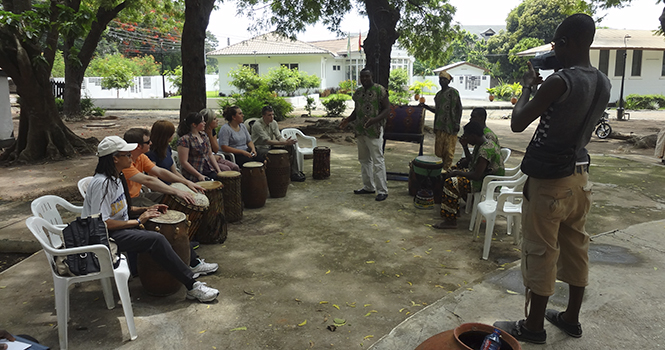Pan-African Studies looks abroad for more opportunities
November 15, 2012
Kaleigh Bowling, senior special education major, visited an elementary school in Ghana this summer where she put her major into action. The school couldn’t provide special education services, so she stepped in to help a deaf student.
“I had heard so many stereotypes,” Bowling said. “Everything changed once I got there, met the people and got to see what the country was like.”
Bowling and six other students traveled to Ghana last summer with the Pan-African Studies Ghana study abroad class led by Francis Dorsey, associate professor of Pan-African Studies.
“To watch these two communicate — they [in Ghana] don’t have special education or assistants — but it was wonderful to watch them interact,” said Dorsey about Bowling’s unique experience. “This isn’t major-specific. It’s across the board, and that’s what’s great about it.”
Amoaba Gooden, interim chair of the department, said the department is working to develop other African study abroad programs in addition to Ghana, including one to Senegal. It is also developing relationships with universities in the Caribbean.
Babacar M’Baye, associate professor of English and Pan-African Studies, said he has already drafted a memorandum of understanding with the Université Gaston Berger in northern Senegal. His goal is to establish a faculty and student exchange program with the university in the near future.
“I hope to be able to encourage students to take classes in African literature, culture and history so they can connect their knowledge with hands on experience in Africa. That’s my goal,” said M’Baye about the program that will be open for all majors to study in the French-speaking country.
Gooden said one of the challenges to creating a study abroad program in Africa is creating student interest and obtaining legal documents to explain the parameters of the program from both universities.
She said the process can take a long time, and the Ghana trip had been planned long before she came to the university in 2006.
“Because we are the department of Pan-African Studies, and we study all African people, this just seems that a natural outcome of that would be a relationship with international places, such as Africa where people of African descent draw their lineage to those parts,” Gooden said.
Dorsey said the Ghana class is the first of its kind to explore the English-speaking country in West Africa. The group toured Elmina and St. George’s castle, slave castles that were once used by Swedish traders, as well as the capital city of Accra and tropical rainforests such as Kukum National Park.
“We go to 6 of the 10 places they tell you to go,” Dorsey said about the trip as he looked at About.com’s list of suggested tourism sites in Ghana. “We hit it all.”
Dorsey said the group also visited and stayed overnight in a traditional Atonkwa village. Next year, he said, they will stay an extra day in the village to paint the walls inside its school.
Grant Brown, senior Pan-African studies and history major, said his schooling helped him appreciate what the country had to offer.
“As a history major, I would be remiss if I didn’t mention the spectacular colonial architecture and the layers of history to be found all over the country,” he said. “As a Pan-African Studies major, I was attracted to Ghana for many reasons. Chief among them was the belief that you can’t really come to know something through study alone but have to go and experience it for yourself.”
Contact Madeleine Winer at [email protected].

























